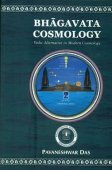Bhagavata Purana, Bhāgavata Purāṇa: 2 definitions
Introduction:
Bhagavata Purana means something in Hinduism, Sanskrit. If you want to know the exact meaning, history, etymology or English translation of this term then check out the descriptions on this page. Add your comment or reference to a book if you want to contribute to this summary article.
In Hinduism
General definition (in Hinduism)
Source: Apam Napat: Indian MythologyThe Bhagavata Purana (भागवत पुराण), also called the Srimad Bhagavatam, extolls the virtues of Lord Vishnu as the supreme personality of the Godhead. It is one of the chief Vaishnavaite Puranas. It was composed by the sage Vyasa. It is divided into 335 chapters, organized into 12 Cantos.
The Cantos are:
- Canto 1 - Creation
- Canto 2 - The Cosmic Manifestation
- Canto 3 - The Status Quo
- Canto 4 - The Creation of the Fourth Order
- Canto 5 - The Creative impetus
- Canto 6 - Prescribed duties for mankind
- Canto 7 - The Science of God
- Canto 8 - Withdrawal of Cosmic Creations
- Canto 9 - Liberation
- Canto 10 - The Summum Bonnum
- Canto 11 - General History
- Canto 12 - The Age of Deterioration
The Bhāgavata Purāṇa is one of the "Maha" Puranic texts of Sanskrit literature, with its primary focus on bhakti (religious devotion) to the incarnations of Vishnu, particularly Krishna. The Sanskrit text comprises twelve skandas (cantos or books) and some 18,000 verses. The Bhāgavata includes many stories well known in Vedic tradition, including the various avatars of Vishnu and the life of Krishna. It was the first Purana to be translated into a European language, with three French translations also between 1840 and 1857.
The intense and personal bhakti described in the Bhāgavata is directed toward Krishna as Vishnu in human form. The Bhāgavata takes the form of a story recounting Vyasa's work being recited for the first time by his son Śuka to the dying King Parikshit, who owes his life to Krishna. Longing to hear of Krishna before he dies, Parikshit hears the Bhāgavata recited by Śuka, including questions by the king and replies by the sage, over the course of seven days.
The Bhāgavata is widely recognized as the best known and most influential of the Puranas, and is sometimes referred to as the "Fifth Veda".
Like all Puranas, the Bhāgavata is a product of oral tradition, its extant version usually dated to the ninth or tenth century CE. The tradition of the Vaisnava scholars of the text puts it contemporary with date of Krishna's birth, known as Janmashtami; 18 July 3228 BCE. The text itself credits Veda Vyasa with its authorship.
etymology: Bhāgavata Purāṇa (Devanāgarī: भागवतपुराण, also known as Śrīmad Bhāgavatam, or Bhāgavata)
See also (Relevant definitions)
Partial matches: Purana, Bhagavata, Puraana.
Ends with: Devi Bhagavata Purana.
Full-text (+9448): Dhumraketu, Sukaramukha, Ksharakardama, Sahasrashruti, Ripunjaya, Dardura, Kapila, Modosha, Rishabha, Vamadeva, Indravaha, Vaihayasi, Devi Bhagavata Purana, Ritadhvaja, Kevala, Nodha, Mahahaya, Mahinasa, Virinca, Rukmabahu.
Relevant text
Search found 59 books and stories containing Bhagavata Purana, Bhāgavata purāṇa; (plurals include: Bhagavata Puranas, Bhāgavata purāṇas). You can also click to the full overview containing English textual excerpts. Below are direct links for the most relevant articles:
Pallava period (Social and Cultural History) (by S. Krishnamurthy)
Typical pastoral village life as reflected from the Govardhanadhari panel < [Chapter 3 - Socio-Religious Life]
Vaishnavism during the Pallava period < [Chapter 3 - Socio-Religious Life]
Conclusion (Social Life) < [Chapter 5 - Conclusion]
The Bhagavata Purana (by G. V. Tagare)
Part 2 - The Date and Authorship of the Bhāgavata Purāṇa < [Introduction]
Part 4 - The Teaching of the Bhāgavata Purāṇa < [Introduction]
Part 1 - Bhāgavata Purāṇa with Ten Characteristic Topics < [Introduction]
Rivers in Ancient India (study) (by Archana Sarma)
12. List of rivers as found in the Purāṇas < [Chapter 5 - Rivers in the Purāṇic Literature]
10. Various other rivers in the Purāṇas < [Chapter 5 - Rivers in the Purāṇic Literature]
12. The river Sarayu and its present status < [Chapter 6 - Changing trends of the Rivers from Vedic to Purāṇic Age]
A History of Indian Philosophy Volume 4 (by Surendranath Dasgupta)
Part 1 - The Bhāgavata-purāṇa (introduction) < [Chapter XXIV - The Bhāgavata-purāṇa]
Part 5 - Eschatology < [Chapter XXIV - The Bhāgavata-purāṇa]
Animal Kingdom (Tiryak) in Epics (by Saranya P.S)
Settlement in Early Historic Ganga Plain (by Chirantani Das)
Part 6 - Rājagṛha supreme seat (a): King Jarāsandha < [Chapter II - Origin and Function of Rājagṛha as the seat of Monarchy]
Related products



